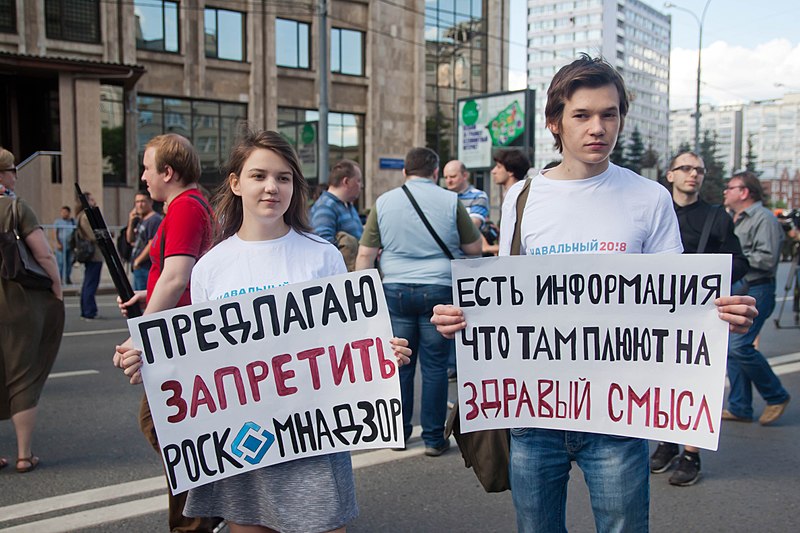 Protesters carry anti-RosKomNadzor signs at an internet freedom rally in Moscow, July 23, 2017. Photo courtesy of Dmitry Rozhkov via Wikimedia commons.
Protesters carry anti-RosKomNadzor signs at an internet freedom rally in Moscow, July 23, 2017. Photo courtesy of Dmitry Rozhkov via Wikimedia commons.
Putin’s War on Information is Accelerating
On April 18th, a Russian court denied Wall Street Journal reporter Evan Gershkovich’s appeal to lift his pre-trial detention following his arrest for alleged espionage on March 29th. As the first American journalist arrested for alleged espionage since 1986, the arrest reveals Putin’s aggressive escalation in the informational battleground. In conjunction with the invasion of Ukraine, Putin has intensified his war on information to justify domestic authoritarian actions that would otherwise bring about civil unrest. Putin sees the world’s increasing interconnectedness as a threat to Russia. His restrictive information laws and detainment of Western nationals are part of a campaign to secure Russian society against “the outside.” These authoritarian controls will continue as long as Putin and his entourage remain in power.
Putin’s authoritarian grip on power in Russia relies on projecting strength and portraying national unity, something deeply engrained in the Russian psyche (The Return of the Russian Leviathan, pg. 65-69). Foreign media and information that are critical of Putin’s regime undermine his façade of personal strength and have the potential to introduce ideas, narratives, and logics that upset societal solidarity. Therefore, when Russia undertakes predictably controversial actions, they are accompanied by tighter restrictions on the information Russians can access.
The May 2008 founding of the RosKomNadzor—the federal agency controlling the public’s access to media and information—facilitated the Kremlin’s control of public attitudes as the Kremlin prepared for war in Georgia and, six years later, Ukraine. Then, in October 2014, after the Russian annexation of Crimea and the Donbas conflict, Putin signed into law an amendment that restricted foreign ownership of Russian media outlets to 20 percent. In December 2022, Russia expanded its 2012 ‘Foreign Agents’ law to allow the state to target anyone “under foreign influence.” The law has forced many foreign news outlets to suspend or significantly limit on-the-ground reporting, particularly about the war in Ukraine. Domestic news and civil society organizations are also affected: the opposition newspaper Novaya Gazeta and the human rights organization Memorial were forced to relocate outside Russia and operate under new organizations, respectively.
Restricting access to information is an authoritarian hallmark; China’s ‘Great Firewall’ is the template from which Russia is modeling the development of its own firewall. For Putin, information restriction policies paired with state-sanctioned violence against offenders function to control organic domestic sentiment and foreign influence operations. Still, while Putin and the Russian state maintain a monopoly on violence, the digital world creates spaces where Russians can evade state filters. Russians are prolific internet users, making up the eighth largest nationality represented online. For Putin, who has long fought against foreign influence, control over the ‘outside’ is needed. Therefore, the foreign agents law, firewall, and arrest of foreign nationals in Russia all seek to extend the state’s control over and ability to resist democratizing forces, movements, and zeitgeists.
Alexei Navalny’s digital opposition campaign, watched by millions throughout Russia and worldwide, exemplifies how information, and ease of access, are detrimental to Putin’s regime security. In an increasingly connected world, heavy restrictions on information are less politically viable. To skirt this issue, Putin used the invasion of Ukraine to garner legitimacy for further restrictions on information freedoms, justifying more authoritarian practices—a positive feedback loop. The world has witnessed Putin’s war on information for the past twenty years, but the world was largely unaffected outside of Russia. This is changing with the arrest of Evan Gershkovich last month.
These arrests and detainments of Americans highlight an emerging Russian strategy of “hostage diplomacy.” As opposition figures flee Russia and Western countries increasingly promote anti-Russian state rhetoric, Putin needs to find more ways of controlling dissidents and subversive information. Detaining foreign nationals, especially Westerners, is a deterrent to dissenting information: foreign news outlets pull out of Russia, and Western countries make concessions to free their citizens. Putin relies on a terror strategy to reign in foreign voices that he perceives as threatening Russian integrity. The West is limited in what it can do to promote the freedom of information inside Russia, especially without risking the well-being of its citizens in Russia. The best counterstrategy is to promote opposition figures and their networks that operate in exile, such as Alexei Navalny’s Anti-Corruption Foundation, Memorial, Novaya Gazeta, and other like-minded organizations. These civil society organizations offer the best prospects for corroding Putin’s grip on power that even a faltering war does not appear to crack.
Image licensed under Creative Commons CC BY-SA 4.0.





